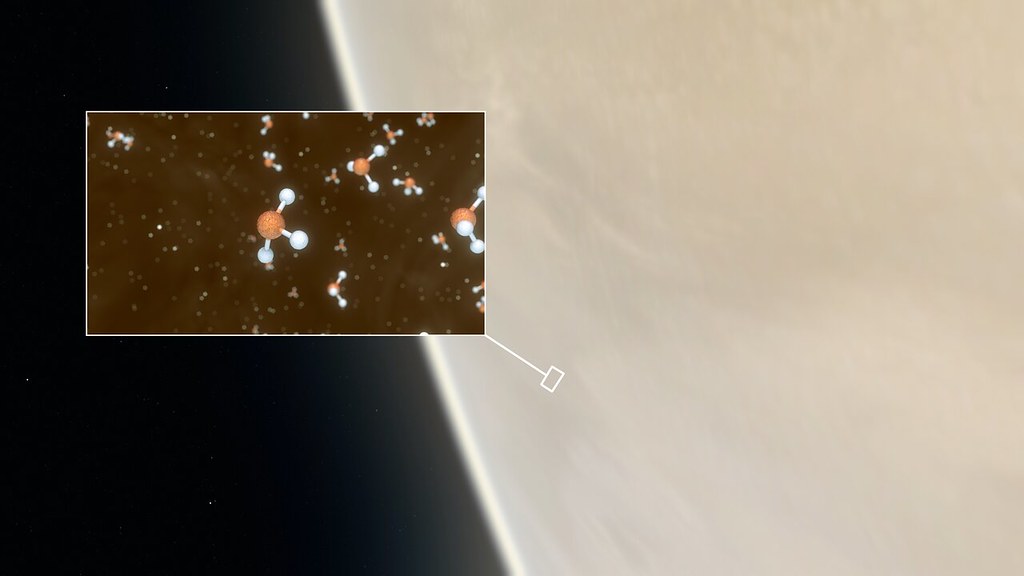Venus, our planetary neighbor, has caught the attention of scientists in their never-ending search for extraterrestrial life. The planet is known for being a terrible place with a surface temperature that can melt lead, but a new study indicates that life may possibly live in the planet’s dense, toxic clouds.
Because of its harsh environment, Venus, the second planet from the sun, is sometimes referred to as Earth’s evil twin. Its atmosphere is primarily made up of carbon dioxide, and sulfuric acid clouds make for a hostile atmosphere. On the other hand, recent research has provided fascinating proof that Venus’ atmosphere contains phosphine gas, which is connected to life on Earth. Scientists are excited about this unexpected finding, which has prompted more research.
Though unlikely, life may survive in Venus’ clouds, so it’s not completely out of the question. An climate that is more friendly is produced by the heavy cloud cover, which protects the planet’s surface from the intense heat. The tenacity and capacity for thriving in challenging circumstances displayed by microorganisms that have adapted to challenging Earth conditions raises the possibility that comparable life forms could exist in Venus’ clouds.
To solve Venus’s secrets and find out if they’re the key to extraterrestrial life, more investigation and study are required. In order to better understand this mysterious planet, scientists are constantly creating new tools and methods that help us get closer to the answer to one of the most important questions facing humanity: are we alone in the universe?
The Sulfuric Acid Clouds of Venus
Scientists have found intriguing evidence in recent studies that suggests the sulfuric acid clouds of Venus, which appear to be unfriendly, may really be able to support life. Despite being unconventional at first, this ground-breaking notion has acquired backing from several results and supporting data. Even though pure sulfuric acid makes up the majority of Venus’ atmosphere, which is an extremely hostile environment, these recent discoveries suggest that Venus may also contain the complicated chemistry required for life to flourish. This implies that life on Venus cannot be totally ruled out despite the intense heat and pressure experienced on the planet’s surface. Such a discovery has really important ramifications that will expand our knowledge of the possibility of extraterrestrial life. Undoubtedly, additional investigation and study of Venus will clarify this intriguing topic and might perhaps produce amazing findings that fundamentally alter our perception of the cosmos.
Life in the Acidic Clouds
Motivated by their interest in the possibility of life in this apparently hostile environment, scientists have spent a great deal of time and energy researching Venus’ sulfuric-acid clouds. The recent discovery that stable amino acids—the fundamental building blocks of life—are present in these acidic clouds has sparked even more curiosity and speculation. This fascinating discovery raises the possibility that the environment inside these clouds is more favorable for the emergence and maintenance of life than previously thought.
Furthermore, some experts have proposed an intriguing theory on the possibility that these clouds are home to life forms that neutralize acid. By neutralizing the acidity, these amazing organisms may be able to create pockets of habitable space within the otherwise hostile acidic environment, making conditions conducive to life. The idea that there are life forms that can neutralize acid adds another level of complexity to the prospect of life on Venus, opening up a universe of fascinating possibilities for investigation and study.
By delving deeper into Venus’s mysteries and figuring out its mysterious clouds, scientists are able to explore new areas of study and broaden our understanding of the possible diversity and adaptability of life on the planet. The ongoing effort to fully understand the complexities of this foreign world presents countless possibilities for learning and expanding our body of knowledge.
The Debate and Ongoing Research
Still, not every scientist accepts this view. Despite the presence of droplets, some contend that Venus’ clouds are too acidic and dry to sustain life as we know it. It’s possible that living things require more than just water to survive. Venus’ atmosphere is still being studied in depth using cutting-edge tools and technology in an effort to better comprehend its composition and establish boundaries around the planet’s possible habitability. The possibility of life on Venus is a topic that sparks interesting discussions and thought-provoking issues thanks to these current investigations, which involve collaborations between experts in numerous scientific areas.
The prospect of life on Venus has reignited interest and intrigue among scientists and space exploration enthusiasts alike, despite the disagreements and uncertainties. The fascinating possibility that bacteria could survive in the peculiar and difficult Venusian atmosphere has sparked new missions and research projects. These missions, which are outfitted with cutting-edge equipment and robotic explorers, are designed to investigate, collect copious amounts of data, and carefully evaluate whether the unique conditions in the Venusian atmosphere may in fact function as a home for microbiological life. We’re still searching for solutions as we work to solve the puzzles surrounding the nearby celestial bodies and expand our knowledge and comprehension of the universe.
In summary
There is still plenty to be discovered about life on Venus. With the expansion of our knowledge about the vastness of the cosmos comes the thrilling possibility of finding life in previously thought-inhospitable areas. We are continuously expanding our knowledge and exploring new areas with technology and science, which may lead to the discovery of extraterrestrial life. From analyzing the unusual atmospheric conditions of Venus to investigating the presence of microbial life forms, scientists are dedicated to uncovering the secrets of this fascinating planet and shedding light on the topic of whether life exists beyond our cosmic neighborhood.
Sources
- Newsweek
- Space.com
- MIT News
- Universe Today
- University of Cambridge Research News
- Arstechnica
- Astronomy.com
![]()
